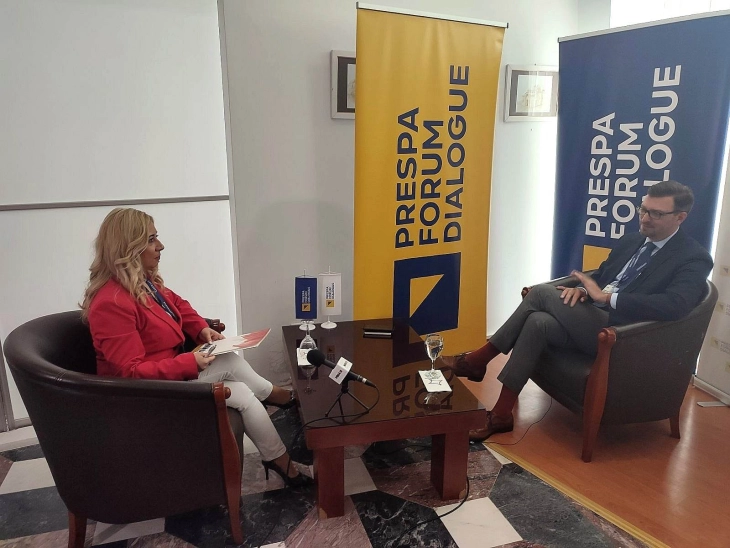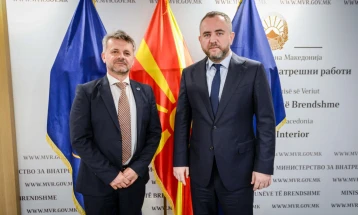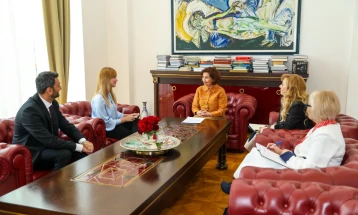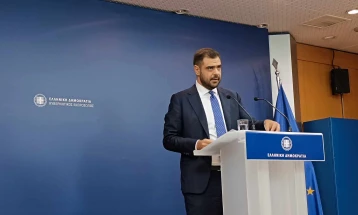Majstorovic for MIA: If EU accepts majority voting decision-making, no nationalist positions could stop enlargement
- If the seven EU member states' initiative for the use of qualified majority voting on key matters instead of decision-making by consensus as before, the EU's strategic interest would prevail and this would apply to enlargement as well, according to Serbian political scientist Srdjan Majstorovic, an expert in the European integration of Serbia and the Western Balkans and a member of the Balkans in Europe Policy Advisory Group.
- Post By Magdalena Reed
- 10:57, 18 June, 2023

Struga, 18 June 2023 (MIA) — If the seven EU member states' initiative for the use of qualified majority voting on key matters instead of decision-making by consensus as before, the EU's strategic interest would prevail and this would apply to enlargement as well, according to Serbian political scientist Srdjan Majstorovic, an expert in the European integration of Serbia and the Western Balkans and a member of the Balkans in Europe Policy Advisory Group.

Speaking on the sidelines of the Prespa Forum Dialogue 2023, Majstorovic also told MIA that the Western Balkans need to focus on resolving remaining disputes and joining the European Union, which, in turn, should also show greater understanding of the situation in the region.

Mr. Majstorovic, do you think that widening the European family by 2030, as is the title of this year's Prespa Forum, is possible given the still unresolved regional issues, the Serbia and Kosovo issue, and the European Union's enlargement fatigue?
Majstorovic: I think this is a rhetorical question. The only possible answer is for the region to recognize this historic moment, which is really dramatic after Russia's aggression against Ukraine. The world is changing, Europe is changing. As German Chancellor [Olaf] Scholz recently said, Europe has to unite so it can survive the future, in a world of uncertainty.
A part of that unification has to be the accession of all six countries from the Western Balkans to the European Union. It is the only way for the European Union to secure its strategic autonomy and to provide itself room for maneuver in creating its destiny. The political elites of the Western Balkans have to realize this momentum is here, accept it, understand it the right way and seriously begin tackling our domestic and regional disputes. Let's begin solving bilateral issues; structural issues like the way Bosnia and Herzegovina works; solving the issue between Kosovo and Serbia.
EU member states also have a great degree of responsibility here, because they are also involved, in a way, in the region's bilateral disputes. They, too, have to recognize this historical context, this strategic context, and show greater understanding of the situation the region is in. By this I mean the specific case North Macedonia and Bulgaria find themselves in. Let's approach solving those remaining issues, which are not simple. They are complex issues and their solutions will determine the fate of the region's citizens.

Seven EU countries have called for the use of qualified majority voting on key matters instead of decision-making by consensus as before. Will this apply to enlargement issues and would it help avoid another Bulgarian veto for North Macedonia? What do you think about this initiative?
Majstorovic: This is an important initiative as it lays the groundwork for the EU's decision-making in the future, which is why the countries of the Western Balkans need to follow with due attention how this process unfolds in the EU itself. The push was made by France and Germany so they should work to find a solution regarding decision-making on important issues, this time primarily common foreign and security policy, by the use of qualified majority voting.
You are right, however. It is not enough to apply this way of decision-making only to foreign policy. It needs to be applied it to all of the EU's important strategic policies. The EU enlargement process is definitely in that group of strategically important issues member states need to decide on. It would make this process much more efficient, so we would not face these situations where, due to internal political and, at times, nationalist positions inside member states, a strategically important policy such as enlargement is being halted.
So if there if the EU Council accepts qualified majority decision-making, I am sure that the EU's strategic interest would prevail in cases like the one with your country, with that ever-present sword of Damocles, of veto hanging over your fate, would definitely have less of a sharp blade.

How do you see North Macedonia's — and the entire region's — European integration process going forward?
Majstorovic: North Macedonia and Albania have a great chance of revitalizing the EU's enlargement. Unfortunately, countries that are currently further along in the process, namely Montenegro and Serbia, have shown a lack of strategy on how to speed it up, due to internal political issues.
I see North Macedonia and Albania as a new wave of candidates whose enthusiasm, committment and energy can bring a new atmosphere to the European integration process. In a way, they can also draw the attention of Serbia and Montenegro to the positive, competitive atmosphere being present again. This will be a joint venture, but those unwaveringly committed to their EU membership will definitely have an advantage.
This process will not be easy. It will not happen overnight. It will take time. But it is important that, 20 years after the Thessaloniki Summit, to move things along in a more palpable way toward the accession of the Western Balkans to the EU.
One step forward would be for Western Balkan candidate countries and EU member countries to agree on two important questions. The first question is: How will these countries become members of the European Union? Bearing in mind the revised accession methodology which has not produced, unfortunately, any expected results so far.
The second question is: When? We also have to think about a time frame, а time horizon, because otherwise we will lose our way again, unable to focus on what is important. And to focus, the time factor is extremely important. mr/
Neda Dimova Prokikj
Photo/Video: Aslan Vishko







